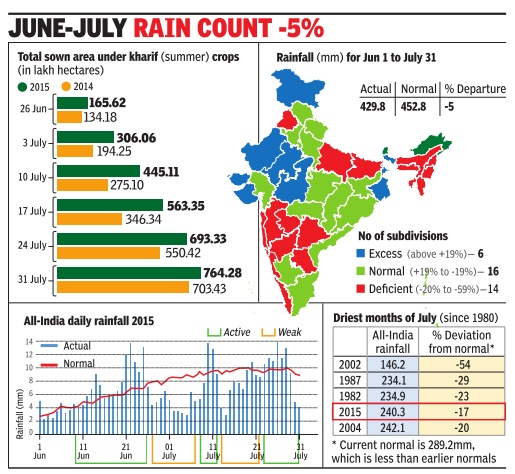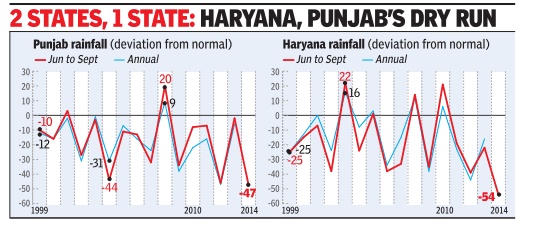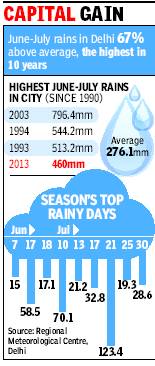Rainfall: India
| Line 30: | Line 30: | ||
While the rain gods have been kind to Delhi, in neighbouring Haryana it’s been a different story. The meteorological district comprising Haryana, Delhi and Chandigarh is the only one in north India where rains have been deficient so far. That’s mainly because of poor rainfall in Haryana. | While the rain gods have been kind to Delhi, in neighbouring Haryana it’s been a different story. The meteorological district comprising Haryana, Delhi and Chandigarh is the only one in north India where rains have been deficient so far. That’s mainly because of poor rainfall in Haryana. | ||
| + | |||
| + | =2015= | ||
| + | ==July== | ||
| + | [[File: July rains.jpg|July 2015; Graphic courtesy: [http://epaperbeta.timesofindia.com/Gallery.aspx?id=12_07_2015_001_034_012&type=P&artUrl=Dehluged-Wettest-July-11-in-5-years-cripples-12072015001034&eid=31808 ''The Times of India''], 11 July 2015|frame|500px]] | ||
| + | [[File: Total sown area under kharif crops 2014-15 and driest months of July, 1980-2015.jpg| Total sown area under kharif crops 2014-15 and driest months of July, 1980-2015; Graphic courtesy: [http://epaperbeta.timesofindia.com/Article.aspx?eid=31808&articlexml=Dry-days-17-rain-deficit-in-July-02082015018030 ''The Times of India''], Aug 02 2015|frame|500px]] | ||
=Rain woes in Punjab and Haryana= | =Rain woes in Punjab and Haryana= | ||
Revision as of 16:45, 20 August 2015
This is a collection of articles archived for the excellence of their content. |
Contents |
2013
Country sees wettest June-July in 19 yrs
The Times of India 2013/08/02
The June- July 2013 rainfall, which has been 117 % of the long period average [LPA] is the highest the country has seen since 1994. The last time there was more rain during this two-month period was in 1994, when the monsoon was 123% of the average. The 528.1mm rain bounty that the country got in the first half of the monsoon season is the third highest in 50 years. The wettest June-July spell during this period was in 1994 (564.7mm) while the second wettest was 1964 (538.1mm). Another interesting feature of this year’s rains has been the absence of a break in the monsoon ever since it covered the entire country in June 16.
Jun-Jul 2013: With 460mm rain, city’s wettest in 10 years
Amit Bhattacharya TNN
The Times of India 2013/08/04
New Delhi: The first two months of the monsoon season have been wettest in the capital in the past 10 years. Delhi’s June-July rain tally stood at 460mm, 67% above normal, which is the second highest of this century after 2003.
The city’s rain aggregate got a huge boost in the second half of July. According to figures provided by the Regional Meteorological Centre, the capital got 238.9mm of rain during July 16-31, which is more than the average for the entire month.
There were 10 rainy days during this period, including the season’s wettest day (July 21), when 123.4mm came down on the city. This late surge lifted July’s rain tally to 340.5mm, 62% higher than the month’s average rainfall of 210.6mm. Since 1990, there have been only three years when the city has got more rain in June-July than this year. Apart from 2003, the other bountiful years were 1994 and 1993.
While the rain gods have been kind to Delhi, in neighbouring Haryana it’s been a different story. The meteorological district comprising Haryana, Delhi and Chandigarh is the only one in north India where rains have been deficient so far. That’s mainly because of poor rainfall in Haryana.
2015
July


Rain woes in Punjab and Haryana
The Times of India, Jun 03 2015

SHOWER SHORTAGE - For 2 grain-bowl states, below-par rain for 16 years
Amit Bhattacharya
IMD's monsoon update predicts 85% seasonal rains for northwest India, indicating that rain woes of the agriculturally crucial states of Punjab and Haryana could continue for another year. Both states have witnessed meteorological droughts in five of the last 10 years, meaning rainfall in half of the past decade has been at least 25% below the long term average (LPA). Last year's monsoon season was among the driest in the recorded history of both states. Punjab received 243.5mm of rain against an LPA of 491.5mm, posting a 50% deficit for the season. It was the second worst monsoon in the state in 113 years (1901-2014), next to only the 67% deficit seen in 1987.
Haryana had an even greater deficit of 56%, with the state receiving 200.1mm rain as against an LPA of 460.3mm. Only two monsoons since 1901 have been worse in the state.
More worryingly, the distress is not limited to the past decade. The two grainbowl states, which were at the forefront of India's green revolution, have been getting below par rainfall for the past 16 years.
According to Met department figures, Punjab has seen just two above normal monsoons since 1999. The last time that happened was eight years ago, in 2008.
Haryana's plight is similar. The June-September rains in the state have been above par on just four occasions in the past 16 monsoons.
Some experts see the chronic monsoon deficien cy in the two states as the worst symptoms of a larger and natural monsoon cycle, which has been in the downswing phase in the past several decades.
Other experts TOI had spoken to when it highlighted this trend last year were of the opinion that the deficit went beyond natural monsoon variability and needed to be investigated.
Interestingly, all through this one-and-a-half decades of depressed rainfall, the ag ricultural output of the two states has been rising.
That's because farmers have been tapping deeper and deeper into the groundwater resources of the region.
According to a Central Ground Water Board report, Punjab overexploits its groundwater annually by 170%, the highest in the country . Of the 138 blocks in the state, groundwater is overexploited in 110 (80%).Haryana is not far behind, with 59% of blocks labelled overexploited.
Many studies, including those using satellite data to map the groundwater situation, have shown that such drawals were unsustainable and the region was fast reaching the limits of such overexploitation.
